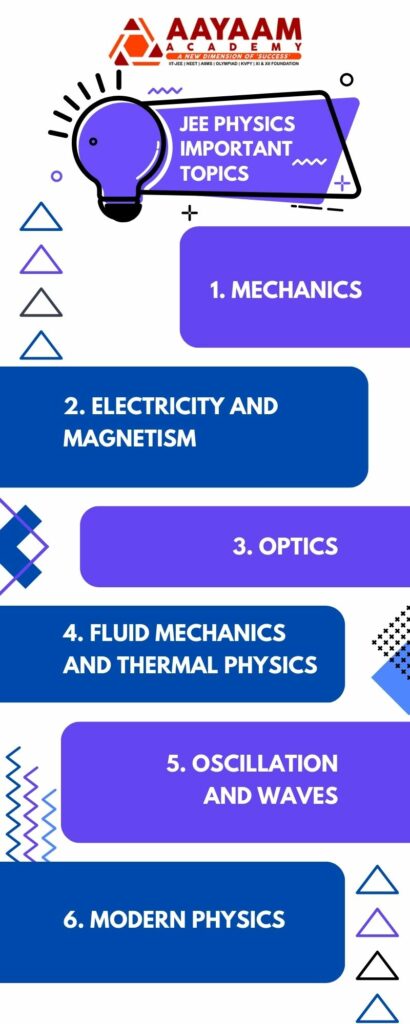
Most JEE aspirants consider Physics to be one of their favorite subjects, as it helps
them develop critical thinking and problem-solving skills. It is also a key subject in highly
competitive exams like JEE Main and Advanced. Questions in the Physics section are
usually based on conceptual knowledge. To score well, you need to have a strong
conceptual base and be able to apply concepts in practice.
The JEE Physics syllabus includes around 20 chapters, with several important topics
that should be focused on while preparing:

1. Mechanics
Questions from this unit are either directly based on mechanical
concepts or require considerable skills in mechanics. JEE mechanics is all about a few
fundamental laws, such as Newton’s laws of motion, laws of gravitation, and laws of
conservation of linear and angular momentum. You should understand and be able to
apply these laws to practical problems. Questions can be solved using the combination
of laws of conservation of energy, Newton’s laws, equation of continuity, work energy
theorem, laws of conservation of momentum, and Bernoulli’s theorem.
2. Electricity and magnetism
This unit is very important for JEE Main and Advanced.
Many questions are asked from capacitance, coulombs law, and its applications. Don’t
be intimidated by complicated circuit problems; try to understand the fundamentals for
reducing them into simpler ones. Practice questions from Kirchhoff’s laws and seriesparallel circuit reduction. Memorize all the formulas and practice questions from
electrostatics, motional EMF, and magnetostatics.
3. Fluid mechanics and Thermal physics
Familiarize yourself with calculations of
work, heat, Carnot engine and its efficiency, internal energy, and the laws of
thermodynamics. Questions from the laws of thermodynamics are often mixed with
calorimetry. Practice questions from fluid mechanics.

4. Oscillation and waves
Around 4 to 5 questions are usually asked from this unit.
Understand complex topics like the principle of superposition, reflection & refraction of
waves, forced and damped oscillations, resonance, Simple Harmonic Motion, and
Doppler effects in sound through visualization. Memorize all the formulas and practice
questions.
5. Optics
This is an easy and high-scoring unit. Practice many questions and focus on important topics like Interference, Young’s double slit experiment, wavefront, Huygens’
principle, Laws of reflection & refraction, Polarisation, Dispersion of light by the prism,
Lens Formula, and Magnification.
6. Modern physics
Mostly theoretical questions are asked from this unit. Focus on
understanding the Bohr’s model of atomic structure. Memorize all the formulas and use
them correctly when answering questions.

IIT JEE Physics Important Topics
- Moment of Inertia
- Rotational Motion
- Energy
- Gravitation
- Conservation Of Momentum
- Superposition Of Waves
- Radiation Wave Optics
- Stefan Boltzmann Law
- Youngs Double Slit Experiment
- Newtons Law Of Cooling
- Conduction
Share
Related Posts
April 4, 2023
Why do you think that you will crack IIT-JEE?
Cracking the IIT-JEE exam is one of the most significant achievements for students who want…
April 4, 2023
How do you feel when you crack IIT-JEE exam?
Cracking the IIT-JEE exam is a significant achievement for students who aspire to pursue a…
April 4, 2023
How do I check my preparation before appearing for the CUET exam?
Preparing for the Common University Entrance Test (CUET) can be a daunting task, and it…
April 3, 2023
What is CUET? How do I prepare for the CUET exam?
The Common University Entrance Test (CUET) is a national level examination in Bangladesh for students…








JEE Main And Advanced 2023